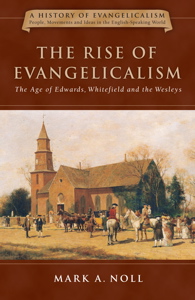 The Rise of Evangelicalism by Mark Noll chronicles the beginnings of evangelical Christianity during the first Great Awakening in the Eighteenth Century through the ministries of Jonathan Edwards, George Whitefield, John and Charles Wesley, William Wilberforce, and others. Noll does a great job of objectively identifying both the spiritual issues that led to great outpourings of the Holy Spirit as well as the social, economic, and political structures that made the Western World ripe for the rapid spread of the gospel through dissenting Christianity.
The Rise of Evangelicalism by Mark Noll chronicles the beginnings of evangelical Christianity during the first Great Awakening in the Eighteenth Century through the ministries of Jonathan Edwards, George Whitefield, John and Charles Wesley, William Wilberforce, and others. Noll does a great job of objectively identifying both the spiritual issues that led to great outpourings of the Holy Spirit as well as the social, economic, and political structures that made the Western World ripe for the rapid spread of the gospel through dissenting Christianity.
Noll points out that Evangelicalism, from its inception, has covered a wide range of theological perspectives and socio-economic classes. Quoting David Bebbington, however, Noll outlines four essential ingredients of evangelicalism:
- Conversion-or the “belief that lives need to be changed.
- The Bible-“belief that all spiritual truth is to be found in its pages
- Activism-dedication of all believers (lay and clergy) to live lives of service for and towards God, especially as manifested in evangelism
- Crucicentrism-conviction that Christ’s death was the crucial matter in providing atonement.
Noll also points out theological convictions that were held across the board for evangelicalism:
- Almost all believed in original sin
- They believed in Justification by faith
- they believed in substitutionary atonement
- They affirmed sanctification through the power of the Holy Spirit
The Rise of Evangelicalism is well balanced in its perspective of the evangelical church. So, for instance, Noll lauds the church for its social involvement in abolishing slavery, but also faults the church for not finding social activism in other areas such as the rights of workers for proper working conditions in Britain. Noll also seems to point some shame on the evangelical church for its lack of commitment to scholarship throughout the history of the movement, pointing out the oddity that Jonathan Edwards is both the first and greatest scholar of the evangelical movement.
The recognition by Noll, that the rise of evangelicalism was primarily about the desire of others to spread the gospel and the work of the Holy Spirit in bringing this about makes this book a great resource for the evangelical reader. Noll has provided a great work for anyone interested in understanding more about the beginnings of the evangelical church. I would gladly recommend this book.

